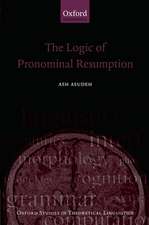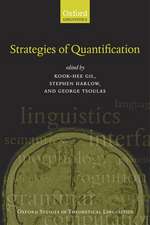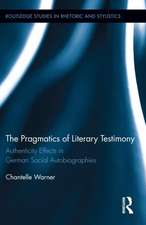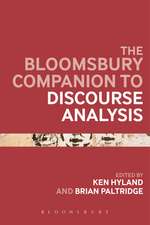Rhetorical Agendas: Political, Ethical, Spiritual
Editat de Patricia Bizzellen Limba Engleză Paperback – 10 aug 2005
| Toate formatele și edițiile | Preț | Express |
|---|---|---|
| Paperback (1) | 209.95 lei 43-57 zile | |
| Taylor & Francis – 10 aug 2005 | 209.95 lei 43-57 zile | |
| Hardback (1) | 435.71 lei 43-57 zile | |
| Lawrence Erlbaum Associates Inc – 22 sep 2005 | 435.71 lei 43-57 zile |
Preț: 209.95 lei
Nou
Puncte Express: 315
Preț estimativ în valută:
40.17€ • 42.06$ • 33.24£
40.17€ • 42.06$ • 33.24£
Carte tipărită la comandă
Livrare economică 07-21 aprilie
Preluare comenzi: 021 569.72.76
Specificații
ISBN-13: 9780805853117
ISBN-10: 0805853111
Pagini: 396
Dimensiuni: 152 x 229 x 22 mm
Greutate: 0.73 kg
Ediția:1
Editura: Taylor & Francis
Colecția Routledge
Locul publicării:Oxford, United Kingdom
ISBN-10: 0805853111
Pagini: 396
Dimensiuni: 152 x 229 x 22 mm
Greutate: 0.73 kg
Ediția:1
Editura: Taylor & Francis
Colecția Routledge
Locul publicării:Oxford, United Kingdom
Public țintă
ProfessionalCuprins
Contents: Preface. Part I: Rhetorical Agendas. L.L. Faigley, Rhetorics Fast and Slow. G.A. Hauser, Moral Vernaculars and Rhetorics of Conscience. P. Mack, Rudolph Agricola's Contribution to Rhetorical Theory. J.J. Royster, Responsible Citizenship: Ethos, Action, and the Voices of African American Women. Part II: History. L. Agnew, The Centrality of Ethos in Eighteenth-Century Methodist Preaching. K.S. Fleckenstein, Between Iconophilia and Iconophobia: Milton's Areopagitica and Seventeenth-Century Visual Culture. C. Gonz lez, Vico's Institutiones Oratoriae: Acumen, Memory, and the Imaginative Universals. D. Gore, The Spiritual and Secular Rhetoric of Happiness in Joseph Smith and John Stuart Mill. C. Kendall, Nooses and Neck Verses: The Life and Death Consequences of Literacy Testing. B.I. Manolescu, Campbell's View of Argument as Comparison Advances His Religious Agenda. Part III: Theory. J. Blitefield, Aristotle, Kenneth Burke, and the Transubstantiation of Place. B. Couture, Private Commitments and Public Rhetoric: Implications for Ethical Practice. R.R. Glejzer, Reading Talmud: Levinas and the Possibility of Rhetoric. G.T. Goodnight, D.B. Hingstman, Rhetoric and Political Economy at the Aesthetic Nexus: A Study of Archbishop Whately. J. Murray, White Space as Rhetorical Space: Usability and Image in Electronic Texts. E. Quandahl, On a Rhetorical Techne of the Moral-Emotions. T. Rickert, Language's Duality and the Rhetorical Problem of Music. L. Walsh, The Scientific Media Hoax: A Rhetoric for Reconciling Linguistics and Literary Criticism. Part IV: Pedagogy. D.M. Brown, Serving Academic Capitalism: The Cultural Function of Community-Based Partnerships. C. Desmet, Progymnasmata, Then and Now. D. Henry, The Traditional Made New: Jasinski's Sourcebook on Rhetoric. M. Holt, A. Rouzie, Electronic Versions of Collaborative Pedagogy: A Brief Survey. T.G. Monberg, Reclaiming Hybridity: How One Filipino American Counterpublic Hybridizes Academic Discourse. B.A. Rothermel, Public Portals, Catholic Walls: Teacher Training and the Liberal Arts at Two Western Massachusetts Colleges for Women in the 1930's, the College of Our Lady of the Elms, and the State Teachers College at Westfield. Part V: Publics. G.D. Clark, Rhetorical Landscapes and Religious Identity. D.L. Cloud, The Doxicon: Image, Strategy, and the Undoing of Consent. K.E. Hoerl, Representing Byron de la Beckwith in Film and Journalism: Popular Memories of Mississippi and the Murder of Medgar Evans. T.J. Kinney, The Political Unconscious of Rhetoric: The Case of the Master-Planned Community. K.D. Kuswa, Are Weapons of Mass Destruction Here? Violence, Blowback, and the Rhetorical Agenda of WMDs. L. Langstraat, Emotion and Community Rhetorics: Victim Impact Statements as Cultural Pedagogy. D.M. Mitchell, Rhetorically Contained: The Construction and Incorporation of Difference in Will & Grace. P. Roberts-Miller, When Agonism is Agony: Thomas Sloane, Controversia, and Political Discourse. L.S. Villadsen, Humanism and Cold War Rhetoric: The Ambiguous Rhetorical Legacy of Niels Bohr. Part VI: Gender. J.A. Bokser, The Persuasion of Esther: A Nun's Model of Silent, Seductive, Violent Rhetoric. B. Burmester, Classical Rhetoric and Nineteenth-Century American Clubwomen: Parallels of Feminist Rhetorics, Civic Reform, and Spiritual Agendas. J. Carlacio, "Feeling" Sentimental: Politicizing Race and Gender in Harriet Jacobs' Incidents in the Life of a Slave Girl. S. Carter, Using the Needle as a Sword: Needlework as Epideictic Rhetoric in the Woman's Christian Temperance Union. C.J. Downer, Beyond Opposition: Reconceptualizing Social Movements Through the Spiritual and Imaginative Rhetorics of This Bridge Called My Back and This Bridge We Call Home. J. Jung, The Perfected Mother: Listening, Ethos, and Identification in Cases of Munchausen by Proxy Syndrome. C.M. Sutherland, Margaret Fell and the Problem of Women's Ethos.
Recenzii
"Bizzell has partnered with forty-two contributing authors. Each author has transformed his or her conference paper for a wider rhetorical and, larger public audience. Astute, bright, and critical, these authors as a whole demonstrate what rhetorical scholarship is and should become....immersion in these pages will not only heuristically rich but also professionally practical."
—Rhetoric Review
—Rhetoric Review
Descriere
This volume represents current theory and research in rhetoric, across disciplines, and is of interest to scholars and students in rhetoric studies in speech communication, English, and related disciplines.


















